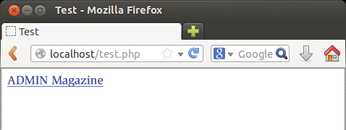Using XML code in PHP scripts with XHP
Intertwined

The PHP XHP extension lets you use HTML and XML tags directly in the PHP code.
PHP scripts typically output HTML code that a browser then displays. Because many variables exist in the PHP code, the code itself can look kind of cryptic, as you can see in Listing 1. The code in Listing 1 dumps the contents of the $url variable in the <a> tag's href attribute, thus constructing a link to the ADMIN magazine website (Figure 1). The people who suffer most from this alphabet soup are template system developers who have difficulty identifying variables even in simple templates.
A PHP extension called XHP makes the code easier to read by letting you just add the HTML to the script and embed the PHP variables, as shown in Listing 2. XHP converts XML (and thus, HTML) blocks into valid PHP expressions. The resulting short notation reduces the error rate and helps programmers maintain an overview.
[...]
Buy this article as PDF
(incl. VAT)
Buy Linux Magazine
Subscribe to our Linux Newsletters
Find Linux and Open Source Jobs
Subscribe to our ADMIN Newsletters
Support Our Work
Linux Magazine content is made possible with support from readers like you. Please consider contributing when you’ve found an article to be beneficial.

News
-
The Next Linux Kernel Turns 7.0
Linus Torvalds has announced that after Linux kernel 6.19, we'll finally reach the 7.0 iteration stage.
-
Linux From Scratch Drops SysVinit Support
LFS will no longer support SysVinit.
-
LibreOffice 26.2 Now Available
With new features, improvements, and bug fixes, LibreOffice 26.2 delivers a modern, polished office suite without compromise.
-
Linux Kernel Project Releases Project Continuity Document
What happens to Linux when there's no Linus? It's a question many of us have asked over the years, and it seems it's also on the minds of the Linux kernel project.
-
Mecha Systems Introduces Linux Handheld
Mecha Systems has revealed its Mecha Comet, a new handheld computer powered by – you guessed it – Linux.
-
MX Linux 25.1 Features Dual Init System ISO
The latest release of MX Linux caters to lovers of two different init systems and even offers instructions on how to transition.
-
Photoshop on Linux?
A developer has patched Wine so that it'll run specific versions of Photoshop that depend on Adobe Creative Cloud.
-
Linux Mint 22.3 Now Available with New Tools
Linux Mint 22.3 has been released with a pair of new tools for system admins and some pretty cool new features.
-
New Linux Malware Targets Cloud-Based Linux Installations
VoidLink, a new Linux malware, should be of real concern because of its stealth and customization.
-
Say Goodbye to Middle-Mouse Paste
Both Gnome and Firefox have proposed getting rid of a long-time favorite Linux feature.

